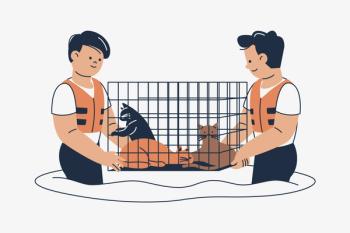
Treat or euthanize? Putting it all together: Prognostic indicators
A look at the positive and negative indicators for anxiety and aggression treatment outcome.
Prognostic factors are an assumption, not a foretelling. While information can be gleaned from statistical groups, each patient functions in an individualized milieu of physiologic, genetic, and environmental factors. Each case must be evaluated individually because no two situations are identical. Broad generalizations should not be used to determine the value of an animal's life. Many cases have successful outcomes even though the case started with a long list of poor prognostic factors. Similarly, some cases appear to have an excellent prognosis on paper but end in a poor outcome. Admittedly, these prediction failures are frequently influenced most by the owner's lack of dedication to working with the animal.
Digital Vision/Getty Images
Positive indicators overall
Factors that generally support a more positive prognosis are:
- There has been no previous intervention for the problem.
- The animal gives considerable warning before biting.
- The animal demonstrates good bite inhibition (no or minor injury) in most or all episodes.
- The owner can successfully implement management steps and control the animal's environment.
- The owner is dedicated and compliant.
- The owner has realistic goals and expectations.
Negative indicators for anxiety
Relatively poor prognostic factors for anxiety disorders include:
- The trigger stimuli are such that the animal's exposure cannot be controlled (e.g. storms).
- The animal's anxiety is causing self-injury.
- There is severe (and costly) property destruction.
- The owner requires immediate or complete resolution.
Negative indicators for aggression
Less favorable prognostic factors for aggression cases include:
- The attacks are unpredictable.
- Little to no warning is given beforehand. (It is important to distinguish that the animal is truly not giving a warning, not that the owner is just failing to recognize it.)
- The bites cause moderate to severe injury most of the time.
- The owner is the target, and the owner cannot control the animal or his or her contact with the animal. (The owner cannot or will not take steps to avoid altercations with the animal.)
- Multiple triggers for aggression or multiple targets are present.
- Young children are present in a home with a resource-guarding dog.
- The targeted victims are elderly, handicapped, immunosuppressed, or otherwise ill.
- The owner is unwilling or unable to make environmental changes.
- The owner is unwilling or unable to make changes in his or her own behavior around the animal.
A conundrum with aggression cases is that the only way to be 100% certain that an animal will bite is when the animal actually does bite. For this reason, we cannot test the success of the behavior program with biting as the measure. Similarly, it is unfair to the animal, the owner, and a potential victim to set up situations that purposely trigger barking, lunging, growling, hissing, swatting, or snapping to test the animal. That means the program's success must be measured in more subtle and, often, less definitive ways.
Newsletter
From exam room tips to practice management insights, get trusted veterinary news delivered straight to your inbox—subscribe to dvm360.






